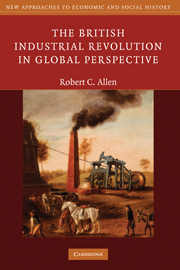1 - The Industrial Revolution and the pre-industrial economy
Published online by Cambridge University Press: 05 June 2014
Summary
The general rule is infallible, that, when by increase of money, expensive habits of life, and taxes, the price of labour comes to be advanced in a manufacturing and commercial country, more than in those of its commercial competitors, then that expensive nation will lose its commerce, and go to decay, if it doth not counterbalance the high price of labour, by the seasonable aid of mechanical inventions … Nottingham, Leicester, Birmingham, Sheffield, &c. must long ago have given up all hopes of foreign commerce, if they had not been constantly counteracting the advancing price of manual labour, by adopting every ingenious improvement the human mind could invent.
T. Bentley, Letters on the Utility … of … Machines to Shorten Labour, 1780This book is about a historical problem: why did the Industrial Revolution happen in Britain, in the eighteenth century? Theories of economic development emphasize technological change as the immediate cause of growth, and that was surely the case for industrializing Britain. The steam engine, the cotton spinning machinery, and the manufacture of iron with coal and coke deserve their renown, for invention on this scale was unprecedented, and it inaugurated an era of industrial expansion and further technological innovation that changed the world. Other features of the Industrial Revolution (rapid urbanization, capital accumulation, increases in agricultural productivity, the growth of income) were consequences of the improvements in technology.
- Type
- Chapter
- Information
- Publisher: Cambridge University PressPrint publication year: 2009



